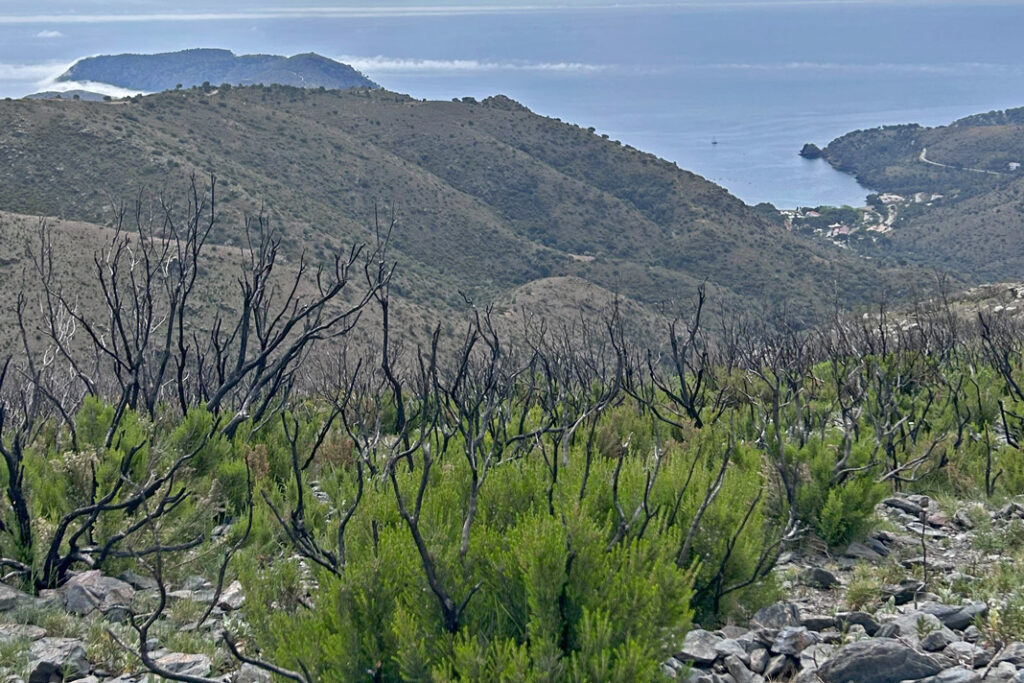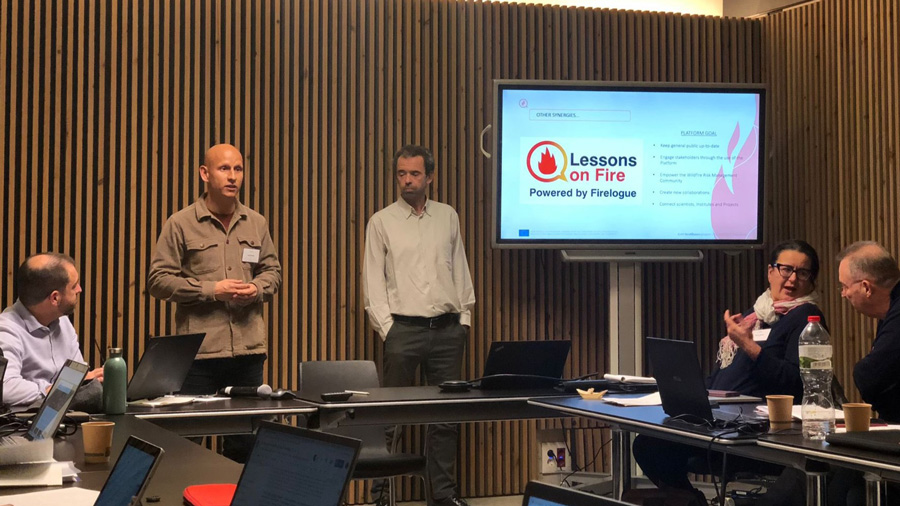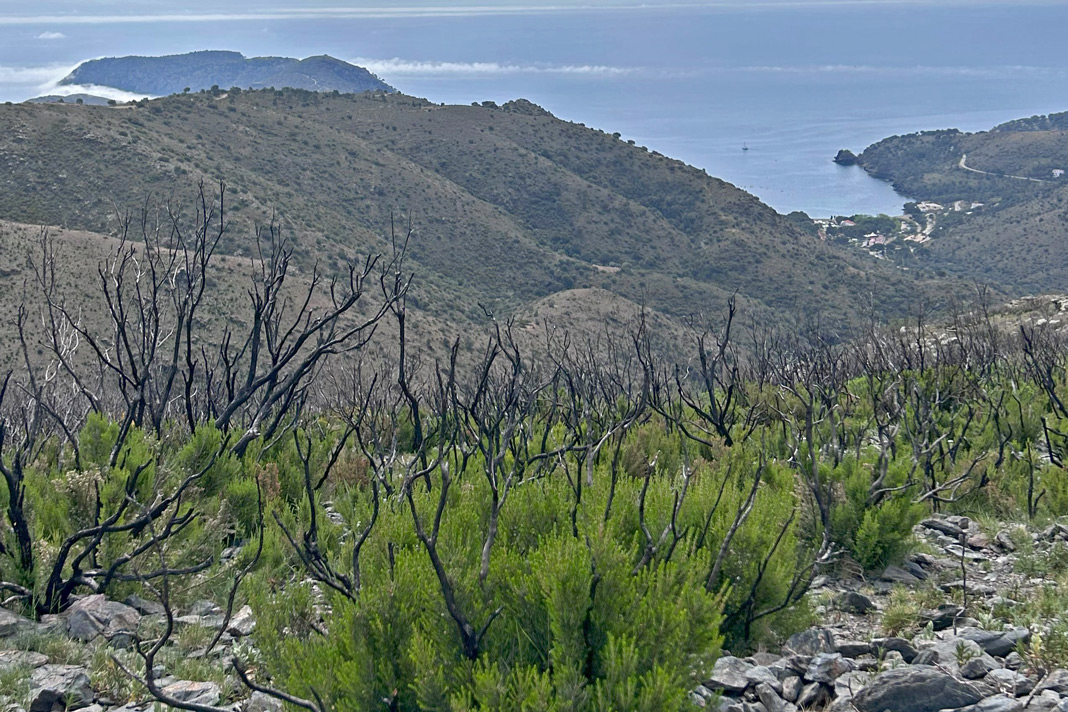
In this interview, David Martín, Project Manager at Pau Costa Foundation, explains the organisation’s role in the EU-funded ResAlliance project and gives his own point of view on some aspects of landscape resilience in the Mediterranean.
A key feature of ResAlliance is the LandLabs. These are programmes of activities and networking platforms in five Mediterranean regions that seek to engage farmers and foresters with a variety of stakeholders and practices in landscape management so that they can gain insight into innovative solutions. David Martín and Mariona Borràs, from the Fundació Pau Costa (Pau Costa Foundation, PCF), are Resilience Ambassadors of the LandLab in Catalonia and the general coordinators of all five LandLabs.
David Martín has been working at PCF since 2019. Educated in environmental science and biodiversity conservation, he became involved in the wildfire domain after working as a volunteer looking into the impact of wildfires in Lithuania in 2011. After this, he worked as a consultant in Spain and a researcher at the University of Greenwich, in the UK. He remembers his time doing research as very fruitful for his career. In fact, it allowed him to develop his current role as Project Manager. Now, he is mainly involved in European Union-funded projects and exploring the potential to address biodiversity and conservation criteria in more holistic wildfire risk management.

Tell us about the Pau Costa Foundation’s role in ResAlliance…
In ResAlliance we have two networks. One is LandNet, at a European scale. This aims to gather stakeholders from across Europe. Another one is the LandLabs, at the regional scale. In these LandLabs we are going to gather and analyse existing agricultural and forestry practices; identify their limitations, needs, and ways forward for improvement; and promote their transferability and scalability by interchanging the stakeholders’ experiences in undertaking them with other regions across the Mediterranean. Thus, we are coordinating the deployment of all five LandLabs during the project, seeking to maximise the interaction between each other and with LandNet, the impact of these practices, and their visibility across Europe.
We have a privileged position because we are also the Resilience Ambassadors of the Catalan LandLab, which means that we will organise and take care of all activities taking place in our LandLab in Catalonia. At the same time, as LandLab coordinators, we will be able to be aware of and follow closely everything that will be happening in the other LandLabs. So, we are in a position in which we will both know what’s going on in each LandLab and be able to explore and suggest synergies between LandLabs. We’ll have that global view and perspective, and that’s a privilege.
To successfully accomplish this job, we can contribute with our experience coordinating stakeholders from the wildfire community. This is one of our most natural objectives in PCF: we connect people and facilitate the ground for the scalability and transfer of solutions. In ResAlliance, the central focus is placed on landscape management, where wildfire risk management is one of the main aspects to be taken into consideration. Also, we can contribute our experience in wildfire prevention, which can be beneficial for other people working in environmental management.
One of the tasks of “Work Package 4 – Knowledge transfer: dissemination and exploitation” is to produce a white paper on policy recommendations for landscape resilience in the Mediterranean region. At which policy level is it aimed?
This is a European project that will seek to interact with the European Commission and other European high-level bodies, as they are the main intended recipients of the white paper. They can help us translate those solutions to the people we ultimately want to reach. Building these relationships is key to causing impact and reaching out to the right people. This is not solely our work since ResAlliance is teaming up with international organisations to maximise the project visibility and the impact of its outputs.
What will be the source of recommendations for this white paper?
The white paper is meant to be written based on the experiences we will have had by the end of the project from the LandLabs and LandNet. Hopefully, we will have gathered best practices, multiple requirements and needs, and useful and interesting insights from the on-the-ground stakeholders we will interact with. We will collect all this information, analyse, and assess it with an eye towards seeking policy impact.
What do you wish ResAlliance to achieve?
The main aim of ResAlliance is to foster knowledge exchange and interaction, and this can go as far as it can go. Hopefully, it will result in a very nice cooperation and collaborative learning experience. I would feel very happy if stakeholders from a LandLab visit other LandLabs, learn from the experiences of the people there, and successfully implement one of the solutions in their own territory. That would be very satisfying.
What do you expect to gain from being part of ResAlliance?
The central focus of the project is not wildfires; it’s landscape resilience in the Mediterranean basin, where wildfires are in fact a major topic. When we look at the current wildfire problem, we think that the solutions lie in the management of the landscape, which is the propagation scenario for a fire. Hence, the solution to preventing catastrophic fires lies in proper landscape management. Along these lines, ResAlliance is about building resilience in the landscape to prepare it for potential adverse events from climate change, like wildfires. It can be beneficial for us because it broadens our scope towards a more holistic perspective.
About landscape resilience, what’s the top priority for building it?
This has to do with the singularity of every single place. I don’t think that is one-size-fits-all. Building resilience in southern Europe could have a different meaning than building resilience in northern Europe. So, building resilience more generally consists of assuming that we are part of an ecosystem with its own processes and dynamics, including natural risks. We have to understand and respect them and adapt our lifestyle to them. This means learning to co-exist with them by mitigating their negative impacts on the environment and human societies so that human activity can go on. Nature is not what we want it to be. It is how it is, and we have to co-exist with its features.
What can we do in our day-to-day lives to help build landscape resilience?
We need to understand that we are part of the solution and a piece of the puzzle that it’s our environment or ecosystem. There are many habits we can develop that contribute to building resilience. Little or sometimes big habits that connect us with our territory. For example, consuming products from the landscape around us. This is sustainable because it avoids bringing products from the other end of the world, which means emitting large amounts of CO2 and a very unsustainable way of living. This also contributes to growing local economies. Not favouring them is one of the main problems and barriers that is preventing us from having resilient landscapes.
Visit ResAlliance’s official website
This article was originally written by:
Pau Costa Foundation’s communications team
The post ResAlliance as an integrated approach to landscape management appeared first on Resilience Blog.
